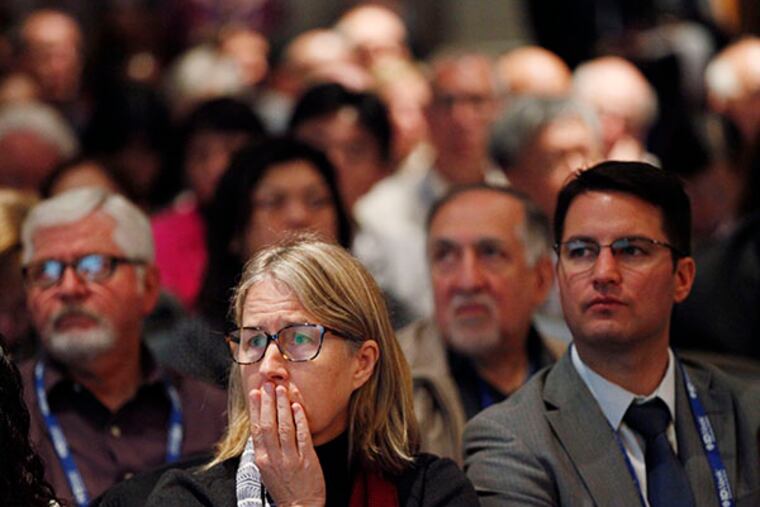At Phila. conference, how a hospital successfully treated Ebola
Bruce Ribner, the infectious-disease doctor who helped save the lives of two medical missionaries with Ebola this summer, shared some shocking, frustrating, and darkly amusing details of his experience with a ballroom full of colleagues Wednesday in Philadelphia.

Bruce Ribner, the infectious-disease doctor who helped save the lives of two medical missionaries with Ebola this summer, shared some shocking, frustrating, and darkly amusing details of his experience with a ballroom full of colleagues Wednesday in Philadelphia.
The idea that Ebola had landed at Emory University Hospital in Atlanta inspired such fear that pizza places refused to deliver and officials threatened to disconnect the sewers.
"These are high-intensity patients," he told the standing-room-only-crowd attending ID Week at the Convention Center. Without naming his patients, Kent Brantly and Nancy Writebol, who contracted the disease in Liberia, Ribner spoke of their suffering with compassion. For days after they arrived at Emory for care, each of them was losing up to 10 liters of fluid a day, more than 2 1/2 gallons. "This is an enormous amount and a truly Herculean effort to keep up with."
The sheer volume pouring out of the patients' bodies required extra protective clothing, including coverage of workers' legs and feet, he said.
The patients were cared for in a separate containment unit that had been built 12 years ago at the request of the Centers for Disease Control and Prevention, to isolate those carrying deadly infections.
Still, unexpected challenges arose.
The DeKalb County Department of Watershed Management warned that if the hospital planned to dispose of Ebola-tainted waste in the toilets, it would be disconnected from public sewerage lines.
The hospital was forced to bleach all waste for five minutes before flushing.
Sheets and other contaminated linens can be placed in leakproof containers and thrown away as "regulated medical waste," the CDC says.
But the contractor who handles this kind of waste for the hospital declined to take it unless it was certified as "free of Ebola." As a result, Ribner said, 350 bags of waste had to be sterilized in autoclaves. It filled 218 boxes and several trailers.
By the time the Ebola patients arrived, Ribner and his staff had been well-trained in "the donning and doffing" of head-to-toe protection.
Even so, everyone was retrained and was not permitted to put on or take off the suits unless a certified colleague was watching to ensure no mistakes were made.
Ribner emphasized that panic was unwarranted and that media reports must be carefully managed to ensure accuracy.
The virus was found on the patients' skin and in every bodily fluid, including semen, he said.
But there is no evidence that the disease is transmitted through the air, and tests in patient areas at Emory showed no traces of Ebola RNA on "high-touch surfaces" such as beds and bathrooms.
"This is not a very difficult infection to eradicate in the environment if you have decent cleanup."
Noting that Thomas Eric Duncan, the Ebola patient in Dallas, had died, Ribner said: "We will not have zero mortality." But with coordinated, careful treatment, he said, most patients treated in the U.S. will survive.
"Emotional support is critical," he added, recalling that one of the Ebola patients said, "I really thought you brought me here so I could die on American soil."
Finally, among all the experiences Ribner shared, in the hope of preparing other hospitals to deal with the challenge, there was one that struck a particularly sensitive chord.
Once they learned that Ebola was being treated at Emory, he said, "pizza-delivery services refused to come to the hospital at night."
A far different perspective was offered earlier in the day by a Canadian doctor, who has cared for Ebola patients in Guinea, one of the countries hardest hit by the epidemic.
"It's grim on the ground," said Robert Fowler, who works with the World Health Organization.
Fowler showed a slide of patients lying on the ground in a treatment facility with no beds. In a room where a patient had died of Ebola days before, the floor was heavily soiled with blood and bodily fluids. There was no way to clean it, he said.
He talked about the lack of soap and water, proper lab tests, and adequate medical supplies. The "buddy system" - in which health workers monitor each other - is impractical when facilities are woefully understaffed.
Still, the best treatment is no different in Africa from that in the United States. Patients need treatment as soon as possible and enough fluids and electrolytes to replace what they lose.
215-854-4944